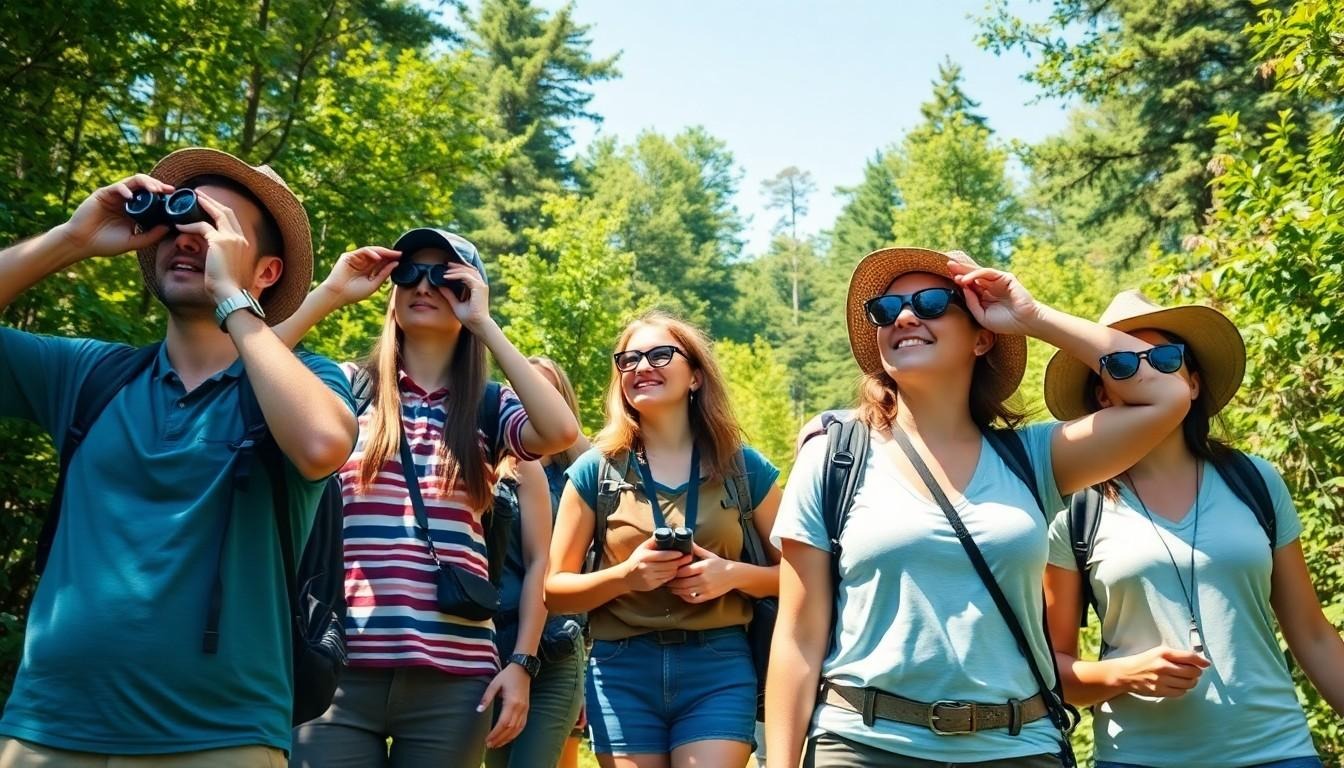In a world where vacations often mean crowded beaches and overpriced souvenirs, eco-tourism emerges as the refreshing alternative that makes Mother Nature proud. Imagine exploring lush rainforests, pristine beaches, and breathtaking mountains while leaving nothing but footprints behind. Eco-tourism isn’t just a travel trend; it’s a lifestyle choice that embraces sustainability and conservation.
By diving into eco-tourism, travelers get to experience the beauty of the planet while supporting local communities and protecting the environment. It’s like giving a high-five to the Earth while sipping organic coffee in a cozy eco-lodge. So, if you’re ready to swap out those tourist traps for breathtaking adventures that respect nature, buckle up! Understanding eco-tourism’s definition is the first step to becoming a responsible traveler who leaves a positive mark on the world.
Eco Tourism Definition
Eco-tourism represents a deliberate and responsible approach to travel that emphasizes environmental conservation. It centers around visiting natural areas with the goal of minimizing tourism’s ecological impact. Travelers engage with local cultures while supporting conservation efforts and sustainable practices in the communities they visit.
This form of tourism includes activities such as hiking, wildlife watching, and exploring natural parks. Each activity prioritizes conservation and educates visitors about ecological sustainability. Tourists partake in experiences that promote awareness of environmental issues and their importance in preserving natural habitats.
Furthermore, eco-tourism encourages responsible interactions with local wildlife and habitats. This approach prevents degradation of environmental resources while fostering respect and understanding between travelers and local populations. Individuals practicing eco-tourism contribute to the economic sustainability of communities through responsible spending.
Organizations and certifications often promote eco-tourism standards, ensuring that providers adhere to sustainable practices. Travelers can look for eco-friendly accommodations and tour operators that prioritize environmental responsibility. Authentic experiences arise from direct engagement with local ecosystems, allowing tourists to build a connection with nature.
In essence, eco-tourism fosters a harmonious relationship between travelers and the environment, emphasizing sustainability and conservation. Its definition encapsulates a commitment to protecting natural landscapes while enriching the travel experience, making it an increasingly popular choice for conscious travelers.
Key Principles of Eco Tourism

Eco-tourism emphasizes a commitment to environmental stewardship and responsible travel practices. This approach ensures that natural resources remain protected while cultural experiences flourish.
Sustainability in Eco Tourism
Sustainability serves as the foundation for eco-tourism practices. It encourages using renewable resources and reducing waste in natural areas. Sustainable accommodations often feature energy-efficient designs and eco-friendly amenities. Travelers choose these options to decrease their carbon footprints. Supporting local economies promotes sustainable livelihoods while ensuring that the community benefits from tourism. They engage in activities that minimize environmental impact, such as hiking or kayaking. Opting for public transportation or walking reduces reliance on fossil fuels, further enhancing sustainability.
Conservation Efforts
Conservation efforts form a crucial aspect of eco-tourism. Protecting habitats and wildlife promotes biodiversity. Organizations dedicated to environmental protection often collaborate with eco-tourism operators. These partnerships lead to initiatives that restore ecosystems and combat threats to wildlife. Travelers contribute to these efforts through entrance fees or donations, aiding local conservation projects. Participating in conservation-focused tours raises awareness about environmental issues. Engaging with local communities also fosters a shared commitment to protect shared natural resources. Through responsible behavior, eco-tourists play a vital role in preserving these areas for future generations.
Benefits of Eco Tourism
Eco-tourism yields several advantages that benefit both travelers and local communities.
Economic Impact
Eco-tourism enhances local economies by generating revenue through sustainable travel activities. Many small businesses, such as eco-friendly lodges and local guides, thrive on the income produced by eco-tourists. In 2019, eco-tourism contributed nearly 20 billion dollars to global economies. Jobs that focus on environmental conservation often result from increased demand for nature-based experiences. With responsible spending, travelers support community development and create opportunities for local artisans and markets. Additionally, eco-tourism fosters investment in local infrastructure, further benefiting residents.
Cultural Preservation
Cultural preservation is a core benefit of eco-tourism, as it promotes the appreciation of local customs and traditions. Travelers often engage in authentic experiences, such as participating in local festivals or learning traditional crafts from artisans. By prioritizing these interactions, eco-tourists encourage communities to maintain and celebrate their cultural heritage. Many eco-tourism initiatives involve partnerships with indigenous groups, ensuring that their voices influence tourism development. These collaborations help protect languages, rituals, and art forms that are at risk of fading away. Thus, eco-tourism fosters respect for unique identities while enriching travelers’ experiences.
Challenges Facing Eco Tourism
Eco-tourism faces significant challenges that can hinder its effectiveness. Addressing these hurdles is essential for sustainable travel.
Over-Tourism
Over-tourism presents a major threat to eco-tourism. Increased visitor numbers often lead to resource depletion and environmental degradation. Popular destinations struggle with overcrowding, causing stress on local ecosystems. For example, the Galápagos Islands experience challenges due to high tourist traffic, which disrupts wildlife habitats. Maintaining a balance between attracting visitors and preserving natural beauty remains difficult. Implementing visitor limits and promoting lesser-known locations can alleviate these pressures. Sustainable management strategies are necessary for protecting sensitive areas while still providing enriching experiences.
Environmental Impact
The environmental impact of eco-tourism can be paradoxical. While the intention is to support conservation, some activities can harm delicate ecosystems. Increased foot traffic in natural reserves leads to soil erosion, vegetation loss, and wildlife displacement. Chemicals from tourism-related activities can pollute local water sources. Effective partnerships among operators, environmental groups, and local communities can minimize these effects. Promoting low-impact activities like guided nature walks instead of motorized tours helps reduce damage. Ensuring that tourism aligns with environmental protection is vital for the future of sustainable travel.
Future of Eco Tourism
The future of eco tourism looks promising as awareness about sustainable travel continues to grow.
Trends and Innovations
Emerging trends reflect a shift toward technology-driven solutions in eco-tourism. Innovative platforms allow travelers to book eco-friendly accommodations and activities easily. Data analytics improves destination management, helping local authorities monitor visitor impacts. Furthermore, virtual reality experiences provide immersive previews of natural sites, fostering connection before trips begin. Renewable energy initiatives are becoming more commonplace in lodgings, significantly reducing carbon footprints.
Collaboration among businesses, non-profits, and local governments drives innovation. Partnerships focus on developing responsible travel guidelines and creating incentives for sustainability. Eco-tourism also sees a rise in community-based tourism models, ensuring local cultures and traditions are respected. Travelers increasingly prefer experiences that offer direct engagement with nature and community, elevating conservation to a priority.
Overall, these trends indicate a vital need for continual adaptation in eco-tourism practices. Acknowledging successes can influence upcoming regulations and frameworks, supporting the industry’s sustainable growth for coming generations.

